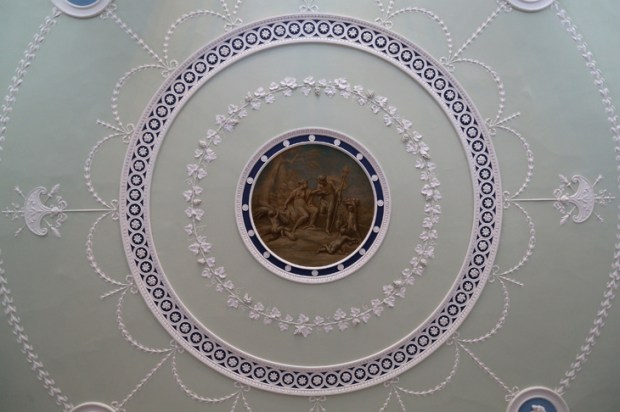Until the late 1960s, the advertising agency J. Walter Thompson ran something called a ‘copy test’. It was a series of questions designed to uncover people with the kind of perverse imaginative talent necessary to work in their creative department.
One question, for instance, was ‘Describe, using no more than 50 words, a piece of toast to a Martian.’ Hundreds of people would write lyrical or technical descriptions in English. One person famously secured a job by writing ‘Floop, floop! Gribble ptáng chiz’nit greep floopiwop.’
Another question was the following: ‘Write, in as few words as possible, a notice for a country club to be placed at the entrance to the swimming baths, requesting that squash players shower before using the pool.’
Before you read on, just spend two minutes trying to answer this yourself. It would be easy to spend hours (as I did) agonising over this question without realising that the question itself is wrong. The ‘correct’ response to this question is not to answer it but to change it.
Instead of putting the notice at the entrance to the swimming pool, why not hang it at the exit to the squash courts? At the pool, the message would be displayed to a lot of nonsquash players to whom it is irrelevant. It will also be seen too late: by the time you have changed into your swimming shorts (or, if this is a French country club, your regulation Operation Yewtree skimpy trunks) it is unlikely that you will double back to the showers. At the exit to the squash courts, by contrast, three simple words will do: ‘Shower before swimming.’ Or you could draw a picture and use no words at all.
I often use this little example as a mental template for thinking about all kinds of things. Generally when a lot of people find some problem difficult, it is often because the question has been defined in the wrong way to begin with. As the systems analyst Donella Meadows explained, many problems in complex systems are best solved by changing the paradigm or underlying assumptions which govern the debate.
Is it possible, say, that the immigration debate is completely wrongheaded? That the correct level of immigration is not ‘lots’ or ‘none’ but is instead a policy which alternates between periods of high immigration and periods of almost none? In other words, that it isn’t immigration that’s the problem, it’s the constancy? I have never heard this even suggested.
To consider this possibility would simply demand a little second-order thinking. And it could transform the nature of the discussion. Certainly the people whose economic position suffers most from immigration are recent immigrants. Are periodic moratoriums the answer? No one would think this suggestion strange in a debate about overfishing. So why reject it here?
Similarly, if you Google the phrase ‘diversity of opportunity’, you get almost no hits. Remove the quotation marks, however, and you get a huge number of hits for ‘diversity and equality of opportunity’. Eh? If people are diverse and it does not really matter whether this arises from genetics or culture or simple preference, then surely you want diverse opportunities, not equal ones? Yet the whole premise of the education system is that you must force everybody, regardless of their differing tastes and aptitudes, to compete for educational success defined along only one dimension.
Imagine the disparity in earnings and waste of talent you would see if all people were appointed to jobs simply on their chess-playing ability. While almost all good chess players tend to be bright, plenty of very bright people can’t play chess at all.
Besides, any sane person can see that any society where everyone is encouraged to seek attainment in the same way will be deeply flawed. When everyone competes directly with everyone else, you don’t have a solution — you have a problem.
I grew up in Wales — the posh bit, mind — and back there, being middle class was pretty easy. You bought a broadsheet newspaper, or the Daily Mail at a pinch, and remembered to remove your pyjamas before leaving the house. That was it. You’d qualified. Here, living in exile among our Saxon occupying forces in the south-east of England, being middle class is a full-time bloody job. It’s insanely rivalrous. All the accoutrements you need — private education, housing, absurd holidays — are expensive: the only things which confer status (this is not a coincidence) are those few things which have not fallen in price. By contrast, all the things that are cheap, easy and convenient are disparaged. You can’t even feed your children’s friends fast food.
To an anthropologist, middle-class English culture is deeply strange. Even holidays have to be effortful: take winter sports, for God’s sake. As a Dublin comedian put it, ‘You knew there was something wrong with our economy when Irish people started going skiing.’ A friend even suggested I went to Machu Picchu. It’s a pile of stones halfway up the Andes, for crying out loud. I can get to Canterbury cathedral in an hour from home, and be back in time for tea. But it’s the effort that’s the thing, see?
People regularly disparage the underclass for lacking a capacity for deferred gratification. In a middle-class enclave you have the opposite problem. Everything pleasurable has to be seen to involve commensurate effort. You can’t just have friends round to drink beer and eat pies: you have to go out and buy matching ramekins and spend the day preparing for the event. TV property and cake-baking propaganda only exacerbates the problem.
The Saxon bourgeoisie is also a matriarchy. If you make £5 million as a musician, you get to sit in a hot tub full of women, drinking vintage Krug from the bottle. Make £5 million as a professional man and you’re forced to buy the Old Rectory, Minchinhampton (Knight, Frank & Rutley, £3.24 million), before spending an additional £5,000 a year on Farrow & Ball paint. And on kitting out your splashback with those elongated white kitchen tiles which are now inexplicably fashionable, even though 15 years ago they were found only in prisons or behind Victorian urinals.
You don’t have to be a rabid Darwinist to wonder who’s drawing the short straw here.
Got something to add? Join the discussion and comment below.
Get 10 issues for just $10
Subscribe to The Spectator Australia today for the next 10 magazine issues, plus full online access, for just $10.















Comments
Don't miss out
Join the conversation with other Spectator Australia readers. Subscribe to leave a comment.
SUBSCRIBEAlready a subscriber? Log in